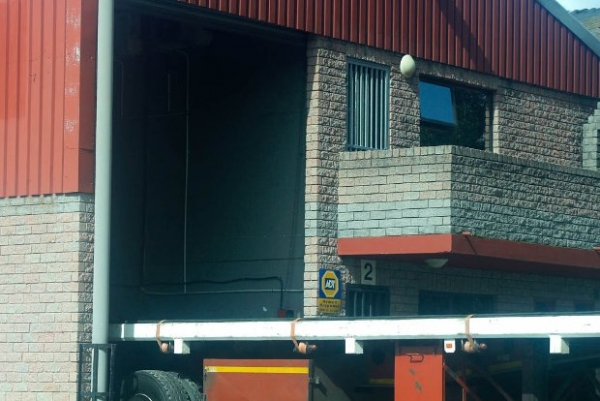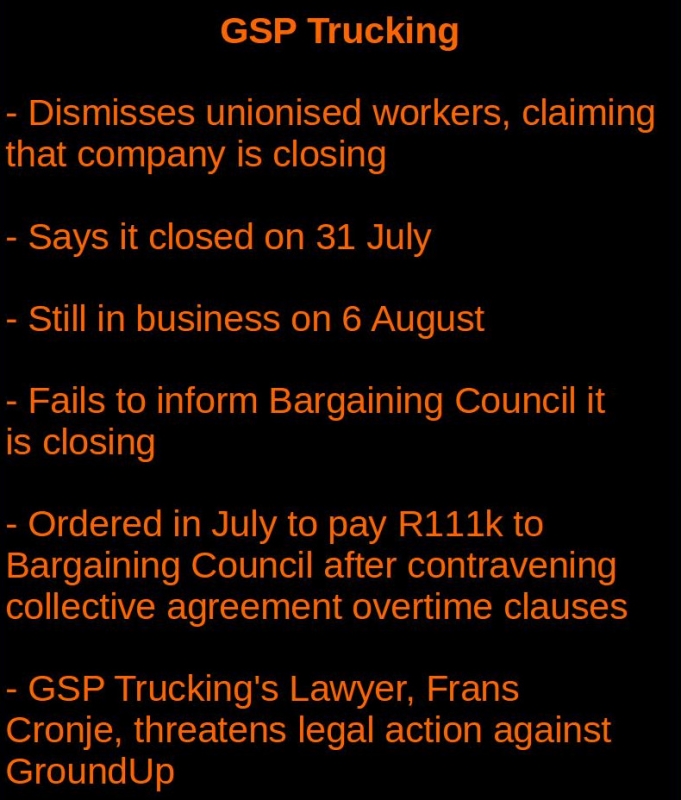Trucking company fires unionised employees

Six Zimbabwean men have accused a Stikland trucking company of dismissing them for having joined the Motor Transport Workers’ Union of South Africa (MTWU). They accuse the company of exploitation and ill treatment, and claim they are owed pay.
A disturbing aspect of this story is that the company claimed it was retrenching the workers because it was closing down at the end of July. But as far as GroundUp can tell the company is still in business.
Van Doorn Pack (Pty) Ltd, trading as GSP Trucking, is based at 2 Penta Park, 80 Willow Road in Stikland.
On 16 July, the employees were given dismissal letters which read: ‘As discussed with yourself and the union, the company has been forced into closure due to severe financial difficulties. We brought this to the attention of the union and also met with the affected staff earlier this week. Due to the seriousness of the situation and the lack of funds, the company has no option but to close by 31 July 2015.’
But this claim is contradicted by the industry’s bargaining council. The general manager of Corporate Services of the National Bargaining Council for the Road Freight and Logistics Industry (Bargaining Council), Karen Daniels, told GroundUp in an email: ‘As far as the [Bargaining Council] records indicate, the company, GSP Trucking, is not closing down. If they are indeed closing down, the [Bargaining Council] has not been informed by the owners of GSP Trucking.’
On 31 July GroundUp emailed the manager of GSP Trucking, Willem Pretorius Strauss, to ask if the company was closing. He didn’t respond. So we phoned him. He refused to comment and referred us to the company’s attorneys.
In an email sent on 3 August, Frans Cronje of Cronje’s attorneys said: “The Company ceased operations on 31 July 2015, due to financial reasons. The contracts of employment of employees were terminated for operational requirements, in accordance with the provisions of the Labour Relations Act.”
GSP Trucking’s attorney, Frans Cronje, threatened legal action against GroundUp if we attempted to contact Strauss.
The letter also threatened legal action against GroundUp, “Please be further advised that Mr WP Strauss was an employee of GSP Trucking (Pty) Ltd and not a shareholder, or director. Kindly refrain from contacting him directly on his personal cell phone number, failing which legal steps will be taken to prevent you from doing so, the costs of which you will be held liable for.”
On 6 August GroundUp phoned Cronje, the company’s lawyer. In a heated conversation, he at first denied knowledge of having communicated with GroundUp but after his letter was read back to him over the phone, he then recalled having sent it. He reaffirmed that his client, GSP Trucking, had informed him that they had closed their business.
Also on 6 August two GroundUp employees contacted GSP Trucking, posing as customers. There was no suggestion from the employees we spoke to that the company is closing. One person, in response to a question of whether they could transport goods a few months from now, reassured us that the business is fine and will continue to be around. GroundUp reporters also took photos of GSP Trucking’s premises on 5 August and there appeared to be ongoing business activity.
The dismissed employees told GroundUp that the company is not bankrupt. They claim that new drivers are being hired. “If they are out of business the trucks should be parked on the premises. If the company is bankrupt the sound thing to do is to sell assets and pay us,” one of the employees said.

Exploitation allegations
The Zimbabweans claim they never signed any contracts and that they worked under difficult conditions without uniforms and protective clothing. Among the freight the drivers ferried were chemicals and manure.
The company operated (or still operates) in all South African provinces, but the main route was Cape Town to Johannesburg. The employees say they sometimes worked seven days a week. They would drive from 4am to midnight, then sleep for four hours before continuing their journey. They claim the trucks have a tracking system and Strauss would call and shout at them if they slept more than four hours. They say Strauss refused to pay for accommodation or garage truck stops to park at night, and sleeping on the side of the freeway put them at risk.
Touws River police station confirmed that a robbery case had been opened on 7 July 2015 by one of the drivers from GSP Trucking. When the driver came back, he says, the company took him through a polygraph test, claiming he might have been involved.
One of the drivers told GroundUp: “We are lucky our families are still intact; one colleague’s marriage fell apart, because the wife thought the husband was lying that we do not get off days … When we returned from a trip, [ready] loaded trucks for the next route were waiting for us … You could go for almost a month without seeing your family.”
The dismissed employees believe they were discriminated against because they are foreigners.
In a letter dated 30 May, addressed to GSP management and signed by 15 employees — most of whom subsequently left the company — they complained about the method used to calculate overtime. They asked management to pay them according to Ministry of Labour standards, instead of the 30 cents per 100km paid by the company. The drivers demanded that they get their annual bonuses straight from the bargaining council. They also stated they had learned the company had not been contributing to the bargaining council Wellness Fund Health Plan, although it had been deducted from the drivers’ salaries every month. They said they wanted the company to give them a proper payslip which showed the number of leave days accumulated, the rate paid per hour and the hours worked, separating normal hours and overtime.
The employees said: “The union helped us a lot. It is the union which discovered the company had not been contributing to UIF and provident fund even though it was being deducted from us.”
One of the employees said he hoped the bargaining council would set an example for other companies who exploit foreigners. “If they remain lenient, the abuse of foreigners in this country will not end. I have worked hard for that company for five years but now I am just discarded like a dirty rag. My head is aching.”
Bargaining Council and the union take action
Karen Daniels of the Bargaining Council said the unfair dismissal disputes had been referred to council by the trade union, MTWU, on behalf of the employees. Other employees who have similar disputes should contact the Bargaining Council as soon as possible.
Regarding non-payment of overtime and public holidays, MTWU had registered a case with the bargaining counciI in April. It had been closed at the request of MTWU as it was engaging with the company, then re-opened when the negotiations failed. The council completed its investigation in July, and found that the company had contravened several clauses in the collective agreement regarding overtime and work on Sundays and public holidays. The company was ordered to pay R111,746 to the council.
The matter had now been referred for arbitration before a senior commissioner, she said.
On UIF, Daniels said the council did not have jurisdiction and that this was a matter for the local Department of Labour to investigate.
Support independent journalism
Donate using Payfast

Don't miss out on the latest news
We respect your privacy, and promise we won't spam you.

This article is licensed under a Creative Commons Attribution-NoDerivatives 4.0 International License.
